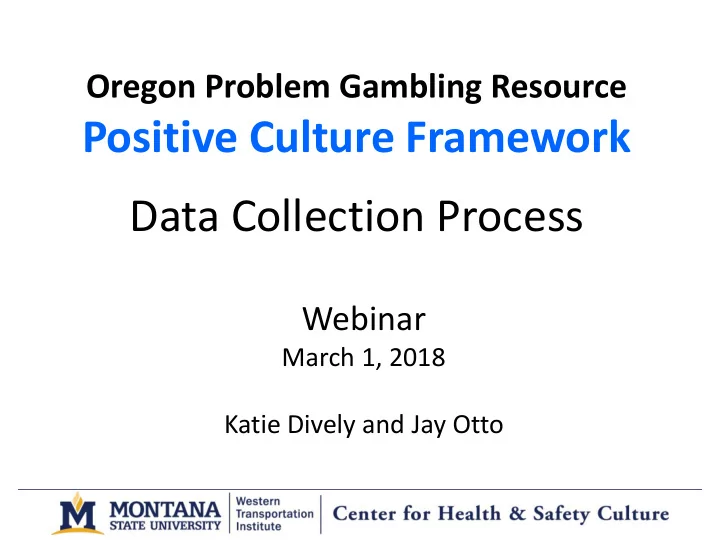

Oregon Problem Gambling Resource Positive Culture Framework Data Collection Process Webinar March 1, 2018 Katie Dively and Jay Otto
Center’s Purpose We are an interdisciplinary center serving communities and organizations through research, training and guidance to cultivate healthy and safe cultures.
Agenda • Core questions we want to answer • Various constructs • Behavioral model • Review methodology • Questions
Positive Culture Framework
Step 2. Assess Culture Context 2.6% of Oregon adults experience moderate or severe problems with • gambling (83,800 people) 5.4% of Oregon adults experience low level problems with gambling • (174,150 people) In 2016, 134 families / significant others got support through OPGR • programs About 1,100 gamblers enrolled in publicly funded problem gambling • treatment programs – does not include those funded with private insurance Source: Gambling & Problem Gaming in Oregon, Oregon Council on Problem Gambling
Step 2. Assess Culture Identify cultural factors that we want to grow in order to increase use of Oregon Problem Gambling Resources.
Core Questions 1. How concerned are people about problem gambling behaviors? 2. To what degree do people have perceived stigma about problem gambling? a) And how does this correlate with their beliefs and behaviors? 3. Are people in situations to intervene with a potential problem gambler? a) If so, how often do people in this situation actually intervene? 4. What are the attitudes and beliefs that predict accessing OPGR?
Concern for Problem Gambling Behaviors Use several vignettes (i.e., short stories) - Written based on DSM Criteria - Independently scored by OPGR counselors - For each vignette, ask: - How concerning is Jay’s gambling behavior? - How concerned would you be if Jay was a close friend or family member? - Agree or disagree: Something should be done to address Jay’s gambling behavior?
Perceived Stigma about PG Use the Problem Gambling Perceived Stigma Scale – Asks to what degree the respondent agrees with 13 statements about what “most people” think about problem gamblers. Example: “Most people think problem gamblers are liars.”
Simplified Behavioral Model Attitudes & Willingness Values Behavior Beliefs & Intention (represents one individual)
Behavioral Model
Behavior Visiting the OPGR website, texting OPGR, and calling OPGR either for - Themselves or for - Someone whom they are concerned about
Willingness / Intention Willingness to visit the OPGR website, text OPGR, or call OPGR for a) yourself b) family member, partner, or spouse c) close friend d) acquaintance or co-worker
Attitude Attitude about contacting OPGR if they were concerned about someone else’s gambling behaviors. - Use 10 pairs of words like Useful vs. Useless Also explore behavioral beliefs and assumptions (24 questions)
Prototypical Image How respondents “feel” about the typical person who would contact OPGR if they were concerned about someone else’s gambling behaviors
Perceived Norms (Injunctive) Perception as to whether other people would - think it was acceptable - would oppose or support - would approve or disapprove of contacting OPGR Also explore normative beliefs
Perceived Norms (Descriptive) Perception as to whether other people would typically contact OPGR if they were concerned about someone
Perceived Control Perception as to whether people feel - They are capable of contacting OPGR; - How easy or difficult it is; and - How comfortable they are. Also explore control beliefs and knowledge
Demographics • Region of Oregon – North Coast, Central Coast, South Coast, Portland Metro Area, Willamette Valley, Columbia River Gorge / Basin, Southern Oregon, Central Oregon, Eastern Oregon • Age • Sex • Education attainment • Race
Methodology Development • Three pilot tests with a convenience sample of 100 adults in Oregon recruited online Implementation • Three hundred respondents recruited online • Age 18+ who live in Oregon • Stratify by age, sex, geography
Questions / Comments
Recommend
More recommend